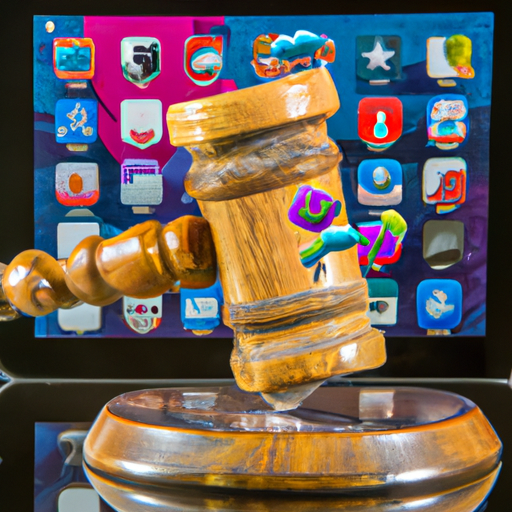In today’s digital age, social media has become an integral part of our lives, both personally and professionally. However, with the widespread use and influence of social media platforms, there arises a new set of legal considerations and challenges for businesses. Whether it is defamation, invasion of privacy, intellectual property infringement, or false advertising, social media claims liability has become a pressing issue that every business owner should be aware of. In this article, we will explore the potential legal risks associated with social media usage, and provide guidance on how businesses can navigate these challenges to protect themselves. Stay tuned to learn more about social media claims liability, and discover the solutions that can help safeguard your business’s reputation and bottom line.
Social Media Claims Liability
In the digital age, social media has become an integral part of our lives. Whether it’s for personal use or business purposes, social media platforms provide a powerful tool for communication and marketing. However, with the rise of social media comes the potential for claims and legal disputes. Understanding social media claims and their implications is essential for businesses to navigate this rapidly evolving landscape.
I. Understanding Social Media Claims
Social media claims refer to the legal actions taken against individuals or companies in relation to content posted on social media platforms. These claims can arise from a variety of issues, including defamation, intellectual property infringement, privacy violations, cyberbullying, and false advertising. It is crucial to understand the different types of social media claims and their potential legal consequences to effectively manage the risks associated with social media use.
II. Types of Social Media Claims
Defamation
One of the most common types of social media claims is defamation. Defamation occurs when a false statement is made about an individual or organization that harms their reputation. On social media, defamatory statements can spread rapidly, causing significant damage to a person’s or company’s reputation. It is essential for businesses to be cautious about the content they post or share on social media platforms to avoid potential defamation claims.
Intellectual Property Infringement
Social media platforms provide easy access to a vast amount of digital content, including images, videos, and written works. However, sharing or using copyrighted material without permission can lead to intellectual property infringement claims. Businesses should always ensure that they have the necessary rights or licenses to use any content they share on social media to avoid potential legal consequences.
Privacy Violations
Privacy violations on social media occur when personal or confidential information is shared without consent. This can include sharing sensitive information about individuals or using their images without permission. Businesses must be aware of privacy laws and regulations to protect themselves from privacy violation claims when utilizing social media platforms.
Cyberbullying
Cyberbullying refers to using social media platforms to harass, intimidate, or threaten individuals or organizations. The anonymity and reach provided by social media can exacerbate the effects of cyberbullying, causing significant emotional distress and harm. It is crucial for businesses to have clear social media policies in place to prevent cyberbullying and promptly address any instances that may arise.
False Advertising
Social media platforms are powerful marketing tools, but they also present opportunities for false advertising claims. Misleading statements or deceptive practices on social media can lead to claims of false advertising, which can have severe legal and financial consequences for businesses. It is essential for businesses to ensure the accuracy and truthfulness of their advertising claims on social media to avoid potential liability.

III. Legal Implications of Social Media Claims
Social media claims can have significant legal implications for businesses. Depending on the nature of the claim, businesses may face monetary damages, injunctions, reputational harm, or even criminal charges. Additionally, social media claims can attract negative attention from the public and impact customer trust and loyalty. Understanding the potential legal consequences of social media claims is crucial for businesses to proactively mitigate their risks and protect their interests.
IV. Establishing Liability in Social Media Claims
Establishing liability in social media claims can be complex. The legal framework varies depending on the jurisdiction and the specific claim being brought forward. Generally, to establish liability, the claimant must demonstrate that:
- The defendant made a false statement, engaged in misleading practices, or violated a legal duty.
- The false statement, misleading practices, or violation caused harm to the claimant.
- The defendant’s actions were the direct cause of the harm suffered by the claimant.
- The defendant posted or shared the content on social media or had control over the content being posted or shared.
Meeting these criteria requires a thorough understanding of the legal principles applicable to social media claims and the ability to gather and present compelling evidence. Seeking legal advice from an experienced attorney is crucial to effectively establish liability in social media claims.

V. Defenses Against Social Media Claims
When faced with social media claims, businesses have several potential defenses at their disposal. These defenses may include:
Truth as a Defense
Truth is defenses in defamation claims. If the statement made on social media is factually accurate, it may serve as a defense against defamation claims. However, it is essential to consult with an attorney to ensure that the claim falls within the boundaries of truth as a defense.
Lack of Intent
In some cases, a lack of intent may serve as a defense against social media claims. If the defendant can demonstrate that they did not intend to cause harm or were not aware of the potential consequences of their actions, it may help in reducing or avoiding liability.
Third-Party Content
Businesses may also argue that they are not directly responsible for the content posted on their social media platforms by third parties. If the business can show that it promptly removed the offending content upon becoming aware of its existence, it may help mitigate their liability.
Consent and Permission
If the business can prove that they had the necessary consent or permission to use the content in question, it may serve as a defense against intellectual property infringement or privacy violation claims.
VI. Case Studies on Social Media Claims
Examining case studies related to social media claims can provide valuable insights into the legal implications and outcomes of such cases. These case studies can serve as practical examples that illustrate the risks and consequences businesses may face when using social media. By analyzing real-life scenarios, businesses can gain a better understanding of how to navigate social media claims and prevent potential legal issues.
VII. How to Protect Your Business from Social Media Claims
To protect your business from social media claims, it is essential to implement comprehensive risk management strategies. Consider the following steps:
- Develop a Social Media Policy: Establish clear guidelines for employees regarding the use of social media platforms and content creation.
- Train Employees: Provide training and education on social media best practices, including the importance of maintaining privacy, avoiding defamatory statements, and respecting intellectual property rights.
- Monitor Social Media Activity: Regularly monitor social media platforms for any content that could potentially lead to legal claims. Promptly address and remove any problematic content.
- Obtain Professional Liability Insurance: Acquire comprehensive professional liability insurance coverage that includes protection for social media claims.
- Consult with Legal Counsel: Seek advice from an experienced attorney who specializes in social media claims to identify potential risks and develop proactive strategies for risk management.
VIII. Steps to Take if Your Business Faces a Social Media Claim
If your business faces a social media claim, it is essential to take immediate action. Follow these steps:
- Preserve Evidence: Gather and preserve all relevant evidence, including screenshots, posts, messages, and any other data related to the claim.
- Consult with Your Attorney: Contact an experienced attorney who specializes in social media claims to evaluate the situation and provide guidance on your next steps.
- Review Insurance Coverage: Review your insurance policies to understand the extent of coverage for social media claims and notify your insurance provider about the claim.
- Prepare a Legal Response: Work closely with your attorney to draft a legal response that addresses the allegations raised in the social media claim.
- Communicate with Stakeholders: Keep your employees, shareholders, and other relevant stakeholders informed about the claim and the actions being taken to address it.

IX. Consulting with an Attorney for Social Media Claims
Given the complexity and potential legal consequences of social media claims, it is crucial to consult with an experienced attorney who specializes in this area of law. An attorney with expertise in social media claims can provide valuable guidance, assess your business’s specific risks, and develop effective strategies to protect your interests. Contact our law firm today to schedule a consultation and discuss your social media claims liability concerns.
X. Frequently Asked Questions (FAQs) about Social Media Claims
-
Can I delete or remove a potentially problematic social media post to avoid liability? Deleting or removing a social media post may not guarantee avoidance of liability. It is crucial to consult with an attorney and consider other factors, such as the extent of the post’s dissemination, before taking any action.
-
How can I determine if a social media claim against my business is legitimate? The legitimacy of a social media claim is best assessed with the help of an experienced attorney. They can evaluate the claim, gather evidence, and provide an informed opinion on the potential legal consequences.
-
What should I do if my business is accused of cyberbullying on social media? If your business is accused of cyberbullying, it is essential to take the accusation seriously. Consult with an attorney to investigate the claim, gather evidence, and develop a response strategy to address the allegations effectively.
-
Is obtaining professional liability insurance sufficient to protect my business from social media claims? While professional liability insurance can provide financial protection for social media claims, it is not enough on its own. Implementing risk management strategies, such as developing a social media policy and training employees, is essential to minimize the risk of claims.
-
What are the potential damages my business may face in a social media claim? The potential damages in a social media claim can vary based on the specific claim and jurisdiction. They may include monetary damages, injunctions, reputational harm, and even criminal charges. Seeking legal advice is crucial to understand the potential consequences for your business.
This comprehensive article provides a thorough understanding of social media claims liability and the necessary steps businesses should take to protect themselves. By implementing effective risk management strategies and seeking legal guidance, businesses can navigate the complex world of social media with confidence and minimize their exposure to potential claims. Contact our law firm today for expert advice and to address any social media claims liability concerns your business may have.
